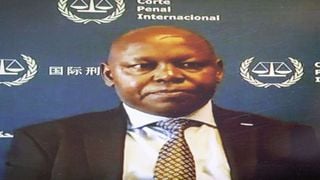
Kenyan lawyer Paul Gicheru when he made his first appearance before the ICC on November 6, 2020, before Judge Reine Adélaïde Sophie Alapini-Gansou of Pre-Trial Chamber A.
| Pool | AFPNews
Premium
ICC: Bensouda to add two charges against lawyer Gicheru
The International Criminal Court (ICC) prosecutor intends to add two more counts against lawyer Paul Gicheru in the witness interference case, whose outcome will have a huge impact on the collapsed trial of Deputy President William Ruto and journalist Joshua Sang.
And the court has ordered Mr Gicheru to furnish the prosecution with evidence he will rely on to defend himself after overruling his objection.
A fresh filing by the Office of The Prosecutor (OTP) also reveals that Ms Fatou Bensounda resumed the collection of evidence as soon as Mr Gicheru surrendered.
The prosecutor commenced ‘certain discrete investigative activities aimed to further consolidate the evidence against him’. She will disclose the evidence collected on a rolling basis within the deadlines set by the court.
The prosecution completed the re-interview of one its witnesses in the Ruto and Sang case, who is described as P-0516, on January 13.
The witness allegedly received a bribe of Sh800,000 from Mr Gicheru in Eldoret in 2013 to withdraw as a prosecution witness in the Ruto/Sang case, documents show.
He was introduced to the lawyer by another witness described as P-0397, who allegedly received Sh500,000 to recant his evidence.
Documents show that witness P-0516 had provided details that linked Ruto and Sang to the 2007 post-election violence (PEV). He linked Dr Ruto to the planning and funding of the violence against Kikuyus.
On July 6, 2014, he was scheduled to attend a meeting with court officials regarding his testimony, but he did not turn up. He also ceased all communication. As a result, the trial chamber issued a summons for his appearance, where he testified between September 22 and 26, 2014.
He renounced almost all material portions of his prior statements to the OTP, which implicated Ruto or Sang. “There are substantial grounds to believe that this recantation was the result of corrupt influence from Gicheru and his associates,” states the document.
However, the witness has since re-joined the prosecution side and is among those Ms Bensouda will use to prove charges against Mr Gicheru.
In the meantime, the OTP is conducting a forensic examination of some undisclosed material. The prosecutor also intends to implement the necessary security measures in respect of the witness.
“The prosecution is making efforts to complete these activities and disclose any new evidence collected as a result as soon as possible. If the evidence can be obtained and disclosed prior to the relevant deadlines, it will likely form the basis for two additional counts of corruptly influencing a witness under article 70(1)(c),” says Bensouda.
On Tuesday, the trial chamber directed the defence to indicate the list of evidence disclosed by the prosecutor that it intends to rely on in defending Mr Gicheru. The aim is to provide notice to the opposing party of the witnesses and documents that will be called, disclosed, referenced or used during the hearing.
Judge Reine Adélaïde Sophie Alapini-Gansou directed Mr Gicheru’s defence team to comply with the order in two days.
“The defence has the obligation to indicate specifically which additional items of evidence, other than those referred to in the prosecutor’s list of evidence, it intends to rely on in order to enable the prosecution to properly prepare its response,” said the judge.
She said that even though it can be expected from the prosecutor to have knowledge of its own documents and items of evidence, the fact that the defence intends to rely on an item is still of interest and benefit to the prosecutor.





